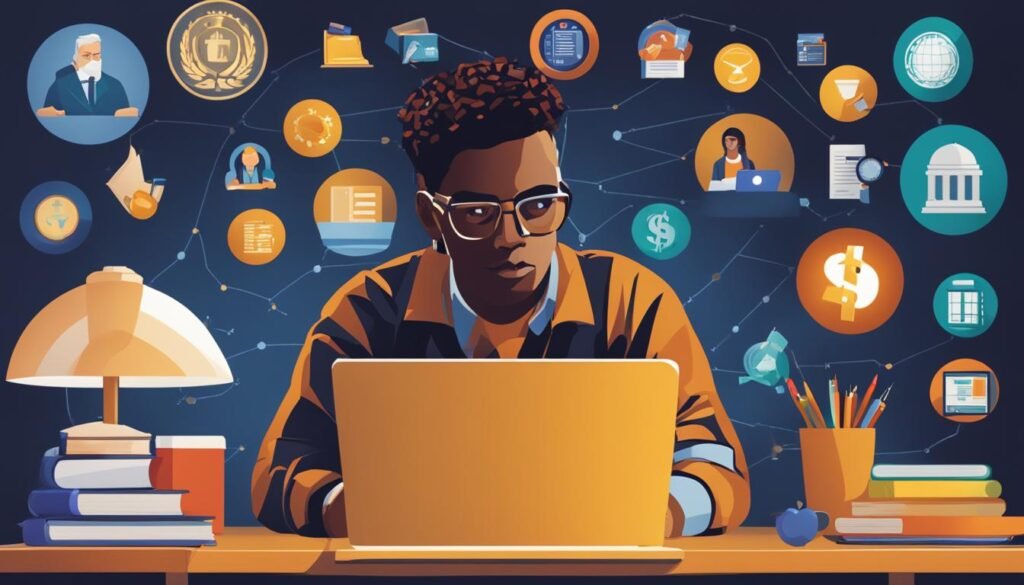If you’re a veteran considering going to college, the process may initially seem overwhelming. However, by following a few key steps, you can streamline your college admissions journey. Here’s a guide to help you prepare for college admissions interviews as a veteran, with tips and strategies to help you succeed.
Key Takeaways:
- Take time to explore potential career paths and identify colleges that offer strong programs in your chosen field.
- Use tools like Niche’s College Admissions Calculator to assess your chances of acceptance.
- Familiarize yourself with financial aid options available to veterans, such as the GI Bill and the Yellow Ribbon Program.
- Choose colleges that cater to veterans and offer support services to help navigate the college experience.
- Connect with current students and alumni to gain insights into their experiences at different colleges.
Choosing the Right College for Veterans

When it comes to choosing the right college as a veteran, there are several factors to consider. You’ll want to find colleges that are not only veteran-friendly but also provide strong support and resources specifically tailored to the unique needs of veterans. By doing thorough research and considering the following factors, you can ensure that you make an informed decision:
- Availability of Career Resources: Look for colleges that offer comprehensive career resources such as job placement assistance, internships, and networking opportunities. These resources can greatly contribute to your success in transitioning from military service to a civilian career.
- Acceptance of the GI Bill: Ensure that the colleges you’re considering accept GI Bill benefits. The GI Bill provides valuable financial assistance for tuition, housing, and textbooks, making it an essential resource for veterans pursuing higher education.
- Support Services for Veterans: Check if the college has dedicated support services for veterans, including mental health counseling, medical support, and academic advising. These services can help you navigate the challenges of college life and ensure a smooth transition.
- Connect with Current Students and Alumni: Reach out to current students and alumni who are veterans themselves. Their firsthand experiences can provide valuable insights into the college’s support for veterans, the overall campus culture, and the quality of education.
By considering these factors and conducting thorough research, you can find the best colleges for veterans that align with your career goals and provide the necessary support for a successful college experience.
| College | Career Resources | GI Bill Acceptance | Support Services for Veterans |
|---|---|---|---|
| Example College 1 | Extensive career counseling, job fairs, and internship programs | Accepts GI Bill benefits | Mental health counseling, veterans’ programs, and dedicated veteran support office |
| Example College 2 | Strong alumni network and connections with industry professionals | Participates in the Yellow Ribbon Program | Medical support services, veterans’ organizations, and academic advisors specialized in assisting veterans |
| Example College 3 | Cooperative education programs and career placement assistance | Offers tuition discounts for veterans | Peer support groups, counseling services, and academic accommodations for veterans |
Choosing the right college as a veteran is a crucial decision that can greatly impact your future success. It’s important to consider not only the academic programs but also the support services and resources available for veterans. Remember to reach out to current students and alumni, explore college websites, and attend open houses or virtual events to gather the necessary information before making your decision.
Veteran-Friendly Colleges: Insights from Alumni
“Attending a veteran-friendly college has made a world of difference in my educational journey. The dedicated support services, including counseling and mentoring, have helped me successfully navigate the challenges of transitioning from military to college life. The career resources provided by the college have also been instrumental in helping me secure internships and job opportunities related to my field of study.” – John, Army veteran, Class of 2020
“I highly recommend looking for colleges that accept the GI Bill and participate in the Yellow Ribbon Program. These colleges often have a strong commitment to supporting veterans and offer additional financial resources to bridge the gap between the GI Bill benefits and tuition costs. It’s also worth considering colleges with a large veteran population, as the camaraderie and shared experiences can greatly enhance your college experience.” – Sarah, Marine Corps veteran, Class of 2019
When choosing the right college for veterans, keep in mind that each veteran’s needs and preferences may vary. It’s essential to find a college that not only meets your academic aspirations but also provides the support and resources necessary to ease your transition into civilian life. By conducting thorough research, seeking insights from alumni, and considering the provided resources, you can make an informed decision that sets you up for success in your educational journey as a veteran.
Financial Aid Options for Veterans

As a veteran, you have access to a variety of financial aid options to help fund your college education. One of the most significant benefits available to you is the GI Bill. This program provides tuition assistance, a housing allowance, and a stipend for textbooks and supplies. To find colleges that accept the GI Bill, you can use the VA’s search tool to ensure you choose a school that aligns with your educational goals.
If you’re considering attending a private school, you may also benefit from the Yellow Ribbon Program. This program allows participating schools to help cover tuition costs that are not fully covered by the GI Bill. It’s important to research and explore private schools that participate in the Yellow Ribbon Program to maximize your financial aid options.
In addition to these programs, there are various scholarships and grants specifically designed for veterans. Many organizations and foundations offer financial assistance to veterans pursuing higher education. Research and apply for these scholarships and grants to further reduce the financial burden of college expenses.
| Financial Aid Option | Description |
|---|---|
| GI Bill | Tuition assistance, housing allowance, and stipend for textbooks and supplies |
| Yellow Ribbon Program | Additional financial support for private schools not fully covered by the GI Bill |
| Scholarships | Financial assistance awarded by organizations and foundations |
| Grants | Financial aid given to veterans based on financial need |
| Work-Study Programs | Opportunities to work on campus and earn income to help cover expenses |
Furthermore, some schools offer work-study programs specifically for veterans. These programs allow you to work on campus and earn income to help cover your college expenses. Participating in a work-study program can not only provide financial support but also valuable work experience during your college years.
Remember to thoroughly research and apply for all available financial aid options. By taking advantage of the support available to you as a veteran, you can make your college education more affordable and accessible.
What Tips Can Veterans Use During College Admissions Interviews?
When preparing for college admissions for veterans, it’s essential to highlight your unique experiences and skills gained during military service. Practice articulating how your military background has equipped you to succeed in higher education. Emphasize your leadership, adaptability, and discipline, showcasing how they will benefit the college community.
Conclusion
Transitioning to college admissions interviews as a veteran may feel overwhelming, but with the right preparation and resources, you can succeed in this important step of your academic journey.
First and foremost, remember to utilize the skills and experiences you gained during your military service. These qualities make you a unique and valuable candidate, so embrace them during your interviews.
To ace your college admissions interviews, practice beforehand. Research common interview questions and prepare thoughtful responses that highlight your strengths and demonstrate your dedication to pursuing higher education. Consider reaching out to fellow veterans who have gone through the interview process to gain insights and guidance.
Lastly, remain confident and stay true to yourself. Your journey as a veteran transitioning to college is an accomplishment in itself, and your dedication and determination will shine through during your interviews. Trust in your abilities and the knowledge you have gained throughout your military career.



